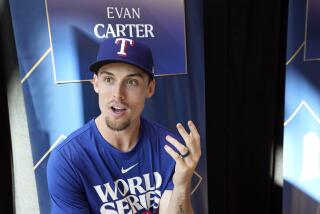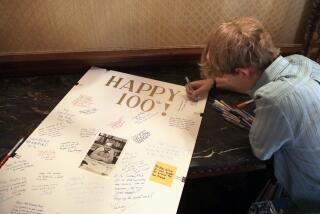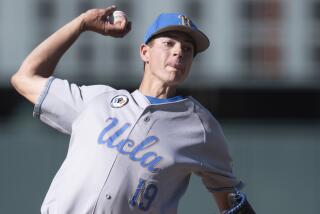Priceless Shortstop
- Share via
It seems fitting that sports pages across the country made a big deal about shortstop Alex Rodriguez accepting a staggering $252-million contract from the Texas Rangers while ignoring a shortstop who could have a greater impact in the years ahead.
Jordan Krall, who grew up in Encino, played shortstop at Harvard-Westlake High and has started for three years at Amherst College, was awarded a Rhodes scholarship last week to study synthetic chemistry at Oxford University in England.
Krall can’t equal Rodriguez’s deeds on the diamond, but he may be unmatched in his own field.
He’s one of only 32 students nationally to become a Rhodes scholar and one of only 2,918 Americans since the first selection in 1903.
President Clinton and former senator and NBA star Bill Bradley were Rhodes scholars. So were Supreme Court justices David Souter and Byron White, singer Kris Kristofferson and sportscaster Pat Haden. The list of Rhodes scholars in the fields of government, law, business, education, medicine, science and the arts is filled with achievers.
Krall, 21, has the potential to win a Nobel Prize for chemistry.
His intelligence is extraordinary. One day during nursery school when parents were invited to class, the teacher asked students to identify numbers. The group of 4-year-olds understood 30, 300, even 3,000. But one boy in the class--Krall--started identifying numbers in the millions.
“I kicked him under the table to stop because other parents were becoming concerned about their kids’ math ability,” said Krall’s father, Michael.
He wanted to play baseball since he was 2. Gloves and bats were more precious than a chemistry set. Spitting sunflower seeds properly was more important than figuring out a Rubik’s Cube.
When he took a 10th-grade chemistry class, Krall found a calling that approached his passion for baseball.
“I was fascinated by the ability to understand things happening around me,” he said.
Krall soon faced the dilemma of balancing his interests in chemistry and baseball without compromising either.
“There was one crucial point in my life,” he said. “My junior year I was trying to make the Chemistry Olympiad team. The first test I wasn’t going to take because I was going to have a baseball game that day.”
Jim Brink, Harvard-Westlake’s baseball coach, insisted Krall take the chemistry test and miss one game.
“That started the duality of doing both at a high level,” he said.
He chose Amherst over Princeton because it was an NCAA Division III school that would give him more time to play baseball and conduct lab research.
For the past two summers, instead of playing ball in Cape Cod, he has come home to work as a lab assistant at Caltech under professor Peter Dervan, recognized as one of the best in his field.
Dervan met Krall while visiting Amherst to give a speech.
“All the teachers and professors said there was this truly outstanding undergraduate to meet,” Dervan said.
Krall became the only undergraduate in Dervan’s research group of 20 working to discover new classes of molecules that bind DNA.
“He fit in with remarkable ease and worked with the passion of somebody who had finished college,” Dervan said. “He was recognized as a special guy.”
Krall had no long-term goal of becoming a Rhodes scholar. Without prodding from his parents and grandfather, he might not have applied.
“It was pretty much a last-minute decision,” he said. “It’s hard to imagine you’re going to be competitive because everyone who does it has such incredible credentials.”
Krall wrote a 2 1/2-page essay that took more than a month to complete and endured several nerve-racking interviews before being selected from 950 applicants.
He called his parents to let them know the news.
“It was hard enough for me to dial the phone at that point,” he said.
While his parents were screaming with joy when they learned of his selection, Krall hardly acted excited, which is typical of his personality.
“I’ve never been big into celebrations,” he said.
After finishing up his senior year of baseball this spring (he batted .333 as a junior), Krall will leave for two years of studies at Oxford, where his sports tastes figure to be broadened.
“I may have to be converted to cricket for a couple of years, but when I come back, I’m definitely going to be playing baseball in an adult league,” he said.
He wants to become a professor of chemistry, with the hope of making discoveries that could have profound implications for the creation of new medicines.
“The toughest thing about chemistry is having patience and realizing if you don’t have results one day, you have to keep going at it and going at it,” he said. “It’s real easy to have the temptation to give up, but you have to persevere and keep going and realize eventually something will come out of the work.”
Krall was asked a difficult question: Would he rather win a Nobel Prize or earn $252 million as the shortstop for the Rangers?
“I’d rather, without a doubt, win a Nobel Prize,” he said. “To discover something new is so much more fascinating, but of course I’d still love to play baseball.”
Dervan said he can’t provide an evaluation of Krall’s hitting skills, but his future as a scientist looks promising.
“He has enormous potential to be successful at whatever he does,” he said. “After his Rhodes scholarship, I’ll save a bench for him.”
Eric Sondheimer can be reached at his e-mail address: eric.sondheimer@latimes.com
More to Read
Go beyond the scoreboard
Get the latest on L.A.'s teams in the daily Sports Report newsletter.
You may occasionally receive promotional content from the Los Angeles Times.











